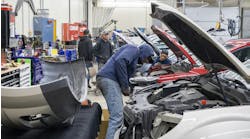The nation’s economy has faltered during the past year or so, to say the least. The value of U.S. homes fell 2.5 percent—$351 billion—in the second quarter of 2008. And a late-’08 stock market meltdown erased more than $1 trillion from American nest eggs, dramatically altering people’s financial goals, lifestyles, sleep and overall health.
Many shop owners have suffered along with the rest of the country. In my area, I see owners downsizing, laying off technicians, shortening hours, and looking more frazzled. Exactly what is stressing us out? An online survey of 1,791 American adults, conducted last year between June 23 and August 13 by the American Psychological Association, revealed our leading sources of stress: money 72 percent, work 68 percent, relationships 59 percent, health 54 percent, housing 47 percent, job stability 42 percent and safety 31 percent.
The week of October 6, when the stock market plunged 18 percent, doctors reported a run of patients whose blood pressures spiked with every dip in the market. Of course, these market dips only create a loss if an investor sells at that point. The best value stocks may well bounce back. But can the investor or the shop owner who sees his monthly wealth steadily dropping hold on until the market and the economy bounce back?
A TIME FOR CALM
Shop owners are action-oriented people. When their business is threatened, the first impulse is to take immediate action to counteract the threat. But in so doing, there is the danger of harming long-term growth. This recession didn’t happen overnight. It took many months to fall into this state, and it will probably take many months for the economy to return to normal. Meanwhile, it’s necessary to survive. But it’s equally vital to prepare for the time when business volume is back to normal again.
Most investment professionals advise their clients to keep things in perspective. A Bear market will eventually turn Bull. Before doing anything foolish, they say, investors should maintain short-term and long-term game plans. Neither paralysis nor hasty action should be part of those plans.
Periods of growth and decline alternate regularly in nature, especially in agriculture. Farmers have to be prepared for some years of drought or natural disaster. Regardless of current weather conditions, they still have to try to plant, to cultivate and to hope for a harvest. Similarly, a slow collision repair season like this one provides shop owners with an opportunity to plant seeds for a richer harvest when business growth resumes an upward climb.
PLANTING SEEDS FOR EVENTUAL GROWTH
It’s important to be “planting seeds” in the minds of employees, suppliers, referral sources and customers. If technicians are to be kept employed during this downturn they need to feel there is a future at the shop. The National Federation of Independent Business offers ideas for employee rewards that may be given during times when finances are not available for commissions or bonuses. They suggest more time off, more flexible schedules and perhaps health-oriented benefits like gym membership dues or help in purchasing exercise equipment.
Likewise, suppliers need to know a shop owner plans to be around for the recovery. While parts purchasing may be down, a supplier may be more willing to be flexible with pricing, discounts and time payment when there is confidence that a customer will be able to ride out the downturn.
Referral sources may also begin to pull away when the volume of jobs begins to decline. This is definitely the time for a shop owner to plant communication seeds. Staying in closer contact can reassure a source that the shop will still be there to service customers with the same quality as always.
LESS ANXIETY IN THE LONG TERM
At the Anxiety and Stress Management Institute in Atlanta, psychologist Alan Behrman’s Thursday schedule includes nine back-to-back appointments, and he now works solidly booked half-days on Fridays—a day he once reserved for non-work-related activities. The career counselor who joined the Institute in late 2008 reports a similarly full appointment calendar. “If you come in any given afternoon, it’s standing-room only in the lobby,” says Behrman, who has referred a couple of clients to financial planners. “I used to replace my box of tissues once a month. Now, it’s every two weeks.”
You, too, may be crying if you take a “now only” view of business and the economy. That’s certain to add stress to just about any shop owner. But a longer-term view that allows time for seeds planted to begin to grow—and abundant growth to resume—can provide some much needed relief, no tissues required.
Tom Franklin, author of Strategies for Greater Body Shop Growth, has been a sales and marketing consultant for more than 40 years.


